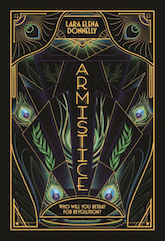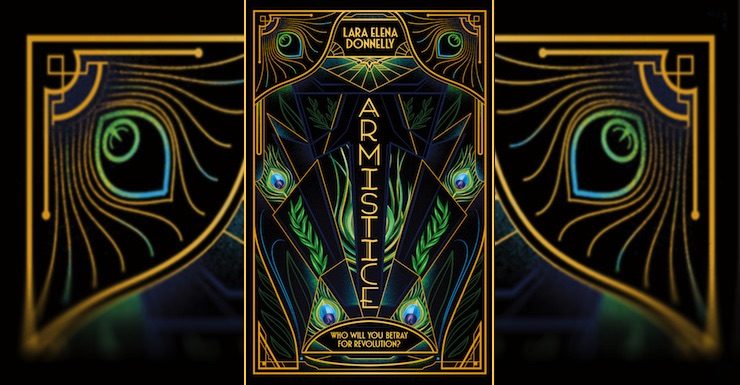Armistice is Lara Elena Donnelly’s second novel, sequel to last year’s disturbing and compelling Amberlough.
With a setting combining influences from Weimar Germany and 1920s London and New York, Amberlough focused on three characters during the rise to power of a fascist government in the federated nation-state of Gedda. Thoroughly compromised intelligence officer Cyril DePaul’s choices went a long way towards making the fascist “Ospie” coup go off without a hitch. Then there’s Aristide Makricosta, burlesque performer, Cyril’s lover, and a trader in drugs, arms and influence: his relationship with Cyril seems a matter of mutual business benefit until it’s too late for either of them to acknowledge the real love and affection—or for that to change the outcome. And last is Cordelia Lehane, a burlesque dancer and small-time crook who gets roped into Aristide’s and Cyril’s schemes and who ends Amberlough as a woman who’s found herself a bloody cause.
Armistice also focuses on three main characters. Two of them will already be familiar to readers of Amberlough: Aristides has survived to reach exile in Porachis, where he’s become a director in the nascent film industry. He’s gone clean, or so he tells himself, but the producer behind his films is involved in the kind of intrigue Aristide thought he left behind.
Buy the Book


Armistice: Book 2 in the Amberlough Dossier
Cordelia has got out of Gedda in time to avoid arrest, as an Ospie clampdown has been rounding up elements of her organisation. She’s the leader of the anti-Ospie resistance movement, but she washes up in Porachis with no friends and few allies. A chance meeting puts her back in touch with Aristides, and catapults her dangerously into the middle of intrigues that have the potential—if everything goes right—to change the position of the resistance movement for the better.
Armistice’s third major character isn’t Cyril DePaul. It’s Lillian DePaul, his sister, an employee of the foreign service in Porachis—the embassy’s public spokesperson, essentially, and very good at her job. She’s been coerced into using her considerable talents for the Ospie administration through the leverage of her eight-year-old son Stephen, at school in Gedda. Stephen’s real father is a secret that Lillian hasn’t managed to keep from her bosses: he’s a minor son of the Porachin royal house, a widower in a matriarchal society where remarriage (or fathering children outside of marriage) is taboo. The scandal would see him disinherited, but the Ospies are using his son’s safety as leverage against him, too.
Lillian’s boss, Maddox Flagg, demands that she act as a honeypot for one of Flagg’s officers—Memmediv, whom Flagg suspects of engaging in intrigues that don’t support the Ospie agenda, or for that matter Flagg’s own career. Lillian’s choices bring her into the middle of the same intrigue and dangerous scheming with which Aristide and Cordelia find themselves surrounded. The question is: who’s going to betray who, and who’s going to get out alive?
Donnelly is very good at writing the kind of espionage, manipulation, and nested secrets that recalls John LeCarré novels and 1970s TV show Sandbaggers: the unglamorous underbelly of blackmail, extortion, and coercion that ruins lives and brings down nations. Her characters are compelling even when one can’t bring oneself to like them even a little bit. And Donnelly evokes her setting—Porachis, a cosmopolitan nation with a thriving film industry—with tactile immediacy and deft skill. Behind the glittering surface of diplomatic parties and early-Hollywood-esque glamour lurks fear and desperation, loyalty and betrayal.
Where Amberlough spiralled down into tight, claustrophobic tragedy, Armistice opens up with the promise of change. It teases with the idea that personal happiness is possible for its protagonists, and the idea that a fascist regime may be opposed—may not, after all, last forever. That makes Armistice a rather easier book to read than Amberlough: less harrowing and less tragic in the Shakespearean sense. It doesn’t hurt than Donnelly paces her twists and revelations very well, creating a remarkably smooth narrative experience.
Armistice is a damn good book. Though I’m not sure I’d call any of the people in it “good.”
Armistice is available from Tor Books.
Read an excerpt here.
Liz Bourke is a cranky queer person who reads books. She holds a Ph.D in Classics from Trinity College, Dublin. Her first book, Sleeping With Monsters, a collection of reviews and criticism, was published in 2017 by Aqueduct Press and is nominated for a Hugo Award in Best Related Work. Find her at her blog, where she’s been known to talk about even more books thanks to her Patreon supporters. Or find her at her Twitter. She supports the work of the Irish Refugee Council and the Abortion Rights Campaign.










